Iran Calls Its Removal From UN Women’s Group ‘Politicized’

Iran’s Foreign Ministry spokesman says the move to remove the Islamic Republic from the UN Commission on the Status of Women was a “politicized move” that “lacked any legal validity”.

Iran’s Foreign Ministry spokesman says the move to remove the Islamic Republic from the UN Commission on the Status of Women was a “politicized move” that “lacked any legal validity”.
Naser Kanaani said Thursday that depriving a “legal” member of the United Nations Commission on the Status of Women of membership “discredits” this international organization paving the way for future abuses of international institutions.
As usual he blamed the US saying that Washington tries to destabilize Iran.
“How a country that is itself a major violator of the rights of the Iranian nation and women can support the rights of Iranian women now?” Kanaani addressed the US without providing any proof.
On Wednesday, the Islamic Republic was voted out of the United Nations Commission on the Status of Women (CSW) for policies contrary to the rights of women and girls.
Members of the UN Economic and Social Council (ECOSOC) adopted a US-drafted resolution to “remove with immediate effect the Islamic Republic of Iran from the Commission on the Status of Women for the remainder of its 2022-2026 term” over the regime’s bloody crackdown on protests ignited by the death of a young woman in custody of the so-called ‘morality police.’
The Commission on the Status of Women (CSW) is the principal global intergovernmental body exclusively dedicated to the promotion of gender equality and the empowerment of women.
Out of the 54-member body, 29 members voted in favor of the resolution while eight voted against and 16 countries abstained.
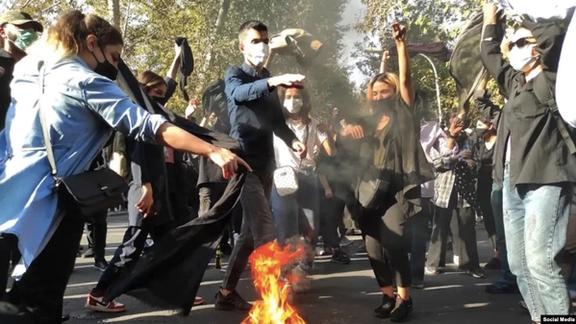
Despite all the tactics the Islamic Republic used to keep its seat at the UN women’s commission, the international community dealt another blow over its rights violations.
In its last session of the year, 29 members of the 54-member UN Economic and Social Council (ECOSOC) voted in favor of a US-drafted resolution to "remove with immediate effect the Islamic Republic of Iran from the Commission on the Status of Women (CSW) for the remainder of its 2022-2026 term."
The move was the first time in United Nations history that a country was expelled from the commission, and the second blow to the Islamic Republic over its brutal crackdown on protests sparked by the death of 22-year-old Mahsa Amini in custody of hijab police. The first step to hold the Islamic Republic accountable was creating a fact-finding mission by the Human Rights Council. The Geneva-based UN Human Rights Council voted on November 24 to launch an independent investigation into the regime’s deadly repression that has killed around 500 civilians, including about 60 children.
Iran had tried its best to keep itself part of the commission through rallying its allies and a behind-the-scenes campaign to exert pressure on academic figures to send letters to numerous global bodies to urge them vote against the move. However, the result of was not unexpected as the regime’s membership in the commission was repeatedly condemned even before the current wave of protests.
During the Wednesday session, the Islamic Republic and its friends, including China and Russia, argued that the expulsion of Iran sets a precedent that may be used against other members in the future. As usual, Tehran’s main strategy was not to address the problem directly but instead accuse other countries of human rights violations.
Another strategy of the pro-Tehran camp was to count on countries that have grievances against the US. Iran's UN Ambassador Amir Saeid Iravani called the move illegal, describing the United States as a bully. "The US request is entirely illegal, as the Council members are fully aware that there is no precedent in the council practice of terminating an elected member's participation in a functional commission for any other reason,” Iravani said.
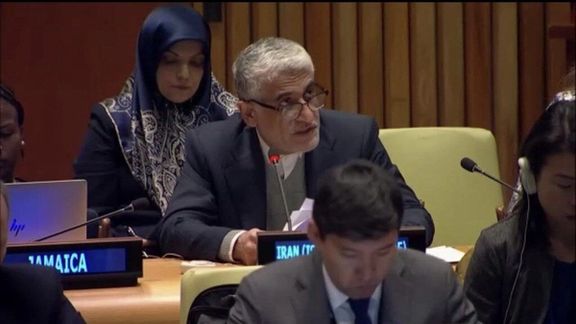
The Russian envoy also tried to make the best use of UN technicalities to stop the vote, asking for a legal review of the draft, but Moscow’s motion was annulled by a quick vote before the main decision.
China's Deputy UN Ambassador Geng Shuang said, "Addressing human rights and women's issues by means of removing Iran from CSW would only set a dangerous precedent, send out the wrong message and bring about negative consequences."
The countries in favor of expelling Iran from the CSW were of the opinion that its membership would be a stain on the name of the commission as the principal global intergovernmental body exclusively dedicated to the promotion of gender equality and the empowerment of women. The text of the draft resolution denounced Iran's policies as "flagrantly contrary to the human rights of women and girls and to the mandate of the Commission on the Status of Women."
Referring to the Iranian protesters, US Ambassador to the UN, Linda Thomas-Greenfield, told ECOSOC that "These women and activists have appealed to us, the United Nations, for support. They made their requests to us loud and clear -- remove Iran from the Commission on the Status of Women.”
She argued that it cannot do its important work “if it's being undermined from within. Iran's membership at this moment is an ugly stain on the commission's credibility.” She noted, “There are few, obviously, right and wrong answers in diplomacy. But today, today we have an opportunity to do something that is clearly the right thing to do. We can act in this moment to support women. We can act in direct response to our constituents, the global community of women.”
The move has been welcomed by many Western countries, many Iranians and activists. In a statement after the vote, US National Security Advisor Jake Sullivan described it as yet “another sign of the growing international consensus on Iran and demands for accountability.”
“Over the last week alone, the United States has issued three separate sets of sanctions targeting Iran’s financing of terror, protest-related human rights violations, and provision of UAVs to Russia for attacks against Ukraine’s critical infrastructure. We have acted in coordination with the EU, UK, Canada, Australia, and others who have issued new sanctions under their own authorities," read the statement.
Israeli Prime Minister Yair Lapid also praised the decision, saying, "Iran's killing of Mahsa Amini and its blatant violations of women's rights disqualify it from being a member of a committee that deals with women's rights.”
Canada-based activist Hamed Esmaeilion, whose daughter and wife were killed by the IRGC, also hailed the action, calling the regime authorities “the enemies of women, life and freedom.”
Former Donald Trump State Department spokesperson Morgan Ortagus tweeted, “Victory! The Iranian regime has been kicked off the UN Women’s Commission! At last, a small but important measure of accountability against the Islamic Republic of Iran for their gender apartheid and crimes against women."
Iranians in several cities, including the capital Tehran and in the Kurdish city of Saqqez, the hometown of Mahsa Amini, poured out onto streets celebrating the decision. Most of them see this as a victory because it may lead to more international measures, or at least make the regime retreat from its iron-fisted crackdown.

Belgian officials say the Islamic Republic of Iran has imposed a 28-year sentence on jailed aid worker Olivier Vandecasteele.
Belgium’s Justice Minister said on Wednesday that Vandecasteele has been sentenced for a “fabricated series of crimes”, stressing that Brussels was doing everything possible to secure his release.
Justice Minister Vincent Van Quickenborne said in parliament that Vandencasteele had been sentenced as retribution for a jail sentence the country imposed on a former Iranian diplomat last year convicted on terror charges.
“This is a compatriot who was innocently arrested in February and has been held under inhumane conditions since,” he added.
The sentence was announced less than 24 hours after a phone conversation between the foreign ministers of Iran and Belgium, the AFP reported.
The detention could be another example of the often-used Iranian tactic of imprisoning foreigners as hostages to exchange them with certain Iranians jailed in Western countries.
Vandecasteele, 41, has served in various international humanitarian organizations since at least 2006, including, Médecins du Monde, Norwegian Refugee Council (NRC), and Relief International.
In July 2021, Relief International ended its relationship with Vandecasteele.
He, however, later returned to Iran on a tourist visa to visit a friend. It is possible that his return to Iran was an arranged trap by Iranian intelligence to detain and exchange him with Assadollah Assadi.
Assadollah Assadi is serving a 20-year prison sentence in Belgium for planning a terror attack in Paris four years ago.
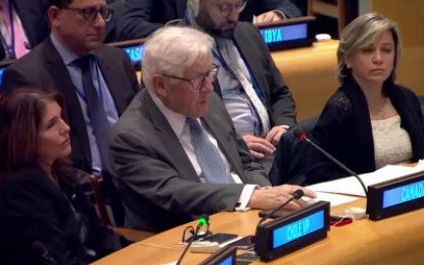
The Islamic Republic was voted out from the United Nations Commission on the Status of Women (CSW) for policies contrary to the rights of women and girls.
On Wednesday, members of the UN Economic and Social Council (ECOSOC) adopted a US-drafted resolution to "remove with immediate effect the Islamic Republic of Iran from the Commission on the Status of Women for the remainder of its 2022-2026 term" over the regime’s bloody crackdown on protests ignited by the death of a young woman in custody of hijab – or the so-called “morality” -- police.
“This vote is another sign of the growing international consensus on Iran and demands for accountability,” US National Security Advisor Jake Sullivan said after the vote.
The Commission on the Status of Women (CSW) is the principal global intergovernmental body exclusively dedicated to the promotion of gender equality and the empowerment of women.
Out of the 54-member body, 29 members voted in favor of the resolution while eight voted against and 16 countries abstained. The Islamic Republic itself, Palestine, Syria, Cuba, China, Russia, Eritrea, Belarus, Zimbabwe, and North Korea voted to keep Iran in the body.
The vote was the first time in United Nations history that a country was expelled from the commission.
It was the second step against the Islamic Republic’s violations of human rights during the current wave of protests. The first step by the United Nations to hold the Islamic Republic accountable for its crackdown on protesters was creating a fact-finding mission by the Human Rights Council. The Geneva-based UN Human Rights Council voted on November 24 to launch an independent investigation into the regime’s deadly repression of protests that has killed around 500 civilians, including about 60 children.
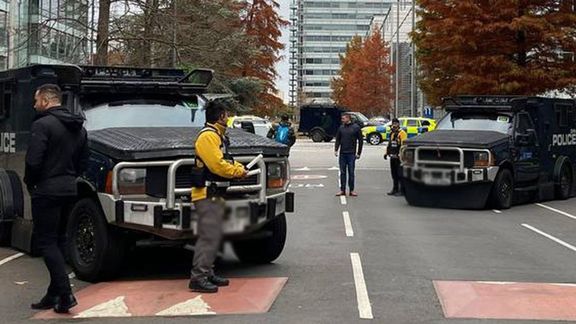
Amid repeated threats by the Islamic Republic against Iran International’s reporters, the UK has vowed to step up protection of London-based journalists.
British Foreign Minister James Cleverly said during a session at the parliament on Tuesday that the Foreign and Commonwealth Development Office (FCDO), in partnership with the Home Office, had ensured that the Iranian journalists were protected by the British police.
“The UK remains absolutely determined to ensure that Iran does not intimidate people within this country. We will always stand up to the aggression from foreign nations,” he noted, adding, “We will absolutely not tolerate threats, particularly towards journalists who are highlighting what is going on in Iran, or indeed any other individual living in the UK.”
One day later, Iran’s Intelligence Minister Esmail Khatib in a television interview repeated threats to “punish all those” who had a role in popular protests against the regime, wherever they might be.
Khatib on November 9 had said the Islamic Republic regards Iran International as “a terrorist organization,” adding that its workers and anyone affiliated with the channel will be pursued by the Ministry of Intelligence all over the globe.
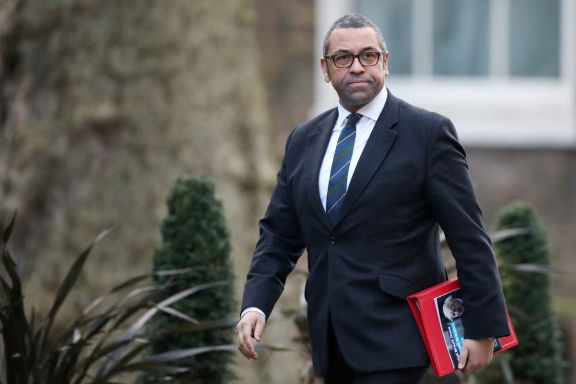
In November, Volant Media, the parent company of Iran International, said that two of its journalists had been notified of direct threats. It said in a statement the Metropolitan Police had formally notified both journalists that these threats represent an imminent, credible and significant risk to their lives and those of their families. Ken McCallum — the head of MI5, the UK’s domestic counter-intelligence and security agency -- said on November 16 that UK authorities have discovered at least 10 “potential threats” since January to “kidnap or even kill British or UK-based individuals perceived as enemies of the regime.”
Expressing the UK’s commitment to hold the Islamic Republic to account, Cleverly said, “These protests in Iran are a watershed moment. After years of repression, the Iranian people have clearly had enough. They are standing up to the authoritarian regime under which they live. Sadly, the regime has responded in the only way it knows: with violence.”
He went on to say the UK has imposed more than 300 sanctions -- including sanctioning the Islamic Revolutionary Guard in its entirety, adding “We will continue to work with partners to challenge the regime’s aggression at home and its disruptive behavior in the region.”
Declining to disclose plans to hit the Revolutionary Guards (IRGC) with further punitive measures after Iran International staff were given armed police protection, he said that it was “counterproductive to detail what future sanctions and designations might be brought in to ensure that the targets of those sanctions do not in any way try to evade the sanctions before they’re brought in”.
Also on Tuesday, UK security minister Tom Tugendhat said that Britain is facing growing interference, threats and influence from state actors including Iran, warning the “emerging era of state-based threats” poses “a challenge to our future and to our society” as well as to freedom of speech in the UK and residents' way of life. “They are threats not just to life — they are threats to our way of life,” he said at London-based think tank Policy Exchange.
The security minister said the Islamic regime’s crackdown on anyone it perceives as a threat to its authority had extended to Britain, noting that “Iran's malign behavior in the Middle East directly threatens our partners and our interests.”
“They are brutally suppressing courageous people in the streets who are calling for an end to the control of a corrupt and corrupted religious security elite claiming authority from God. All of this is clear, much of it has been clear for some time. What’s new is that we’re seeing this grow at home,” he said.
“Since Ken McCallum’s speech just a few weeks ago we’ve seen even more out of Iran,” Tugendhat said. “This is not and has not yet finished.”
Faced with nationwide antigovernment protests since mid-September, the Islamic Republic has blamed foreign-based Persian broadcasters such as BBC Persian and Iran International of “fomenting unrest”, while all media in the country are under tight government control and present protesters as “rioters” and “terrorists”.
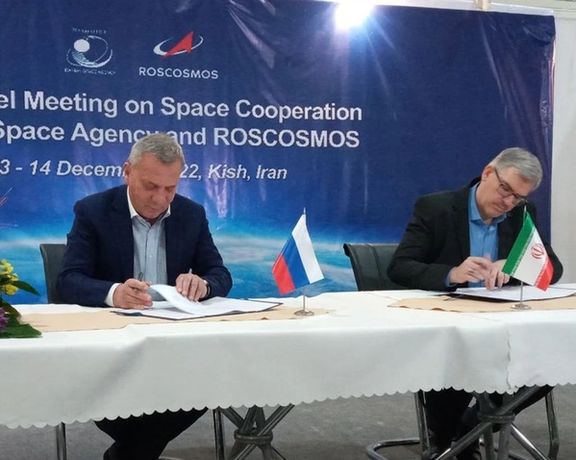
As the world expresses concerns over close military cooperation between Iran and Russia, they have signed a new agreement on cooperation in the space industry.
According to ISNA in Tehran, the two sides have agreed to jointly design and construct remote sensing and telecommunication satellites.
Joint development of infrastructure as well as holding training courses in this regard are among the other details of an agreement revealed on Wednesday.
The document was signed Wednesday by Iran’s head of Space Agency Hassan Salarieh and his Russian counterpart Yury Borisov on the sidelines of an International Aerospace Exhibition in the Kish Island in southern Iran.
Earlier in August, Iran launched a satellite called Khayyam into space from the Baikonur space station in Kazakhstan using Russia's Soyuz satellite carrier rocket.
The UK on Tuesday sanctioned 12 Russian military officials involved in missile strikes on Ukrainian cities as well as some Iranian businessmen involved in the production and supply of military drones used in the attacks.
The EU foreign ministers also lashed out at the Iranian regime Monday for supplying drones to Russia, saying the “weapons provided by Iran are being used indiscriminately by Russia against Ukrainian civilian population and infrastructure causing horrendous destruction and human suffering.”
The bloc sanctioned four people and four entities “for undermining or threatening the territorial integrity, sovereignty and independence of Ukraine.”